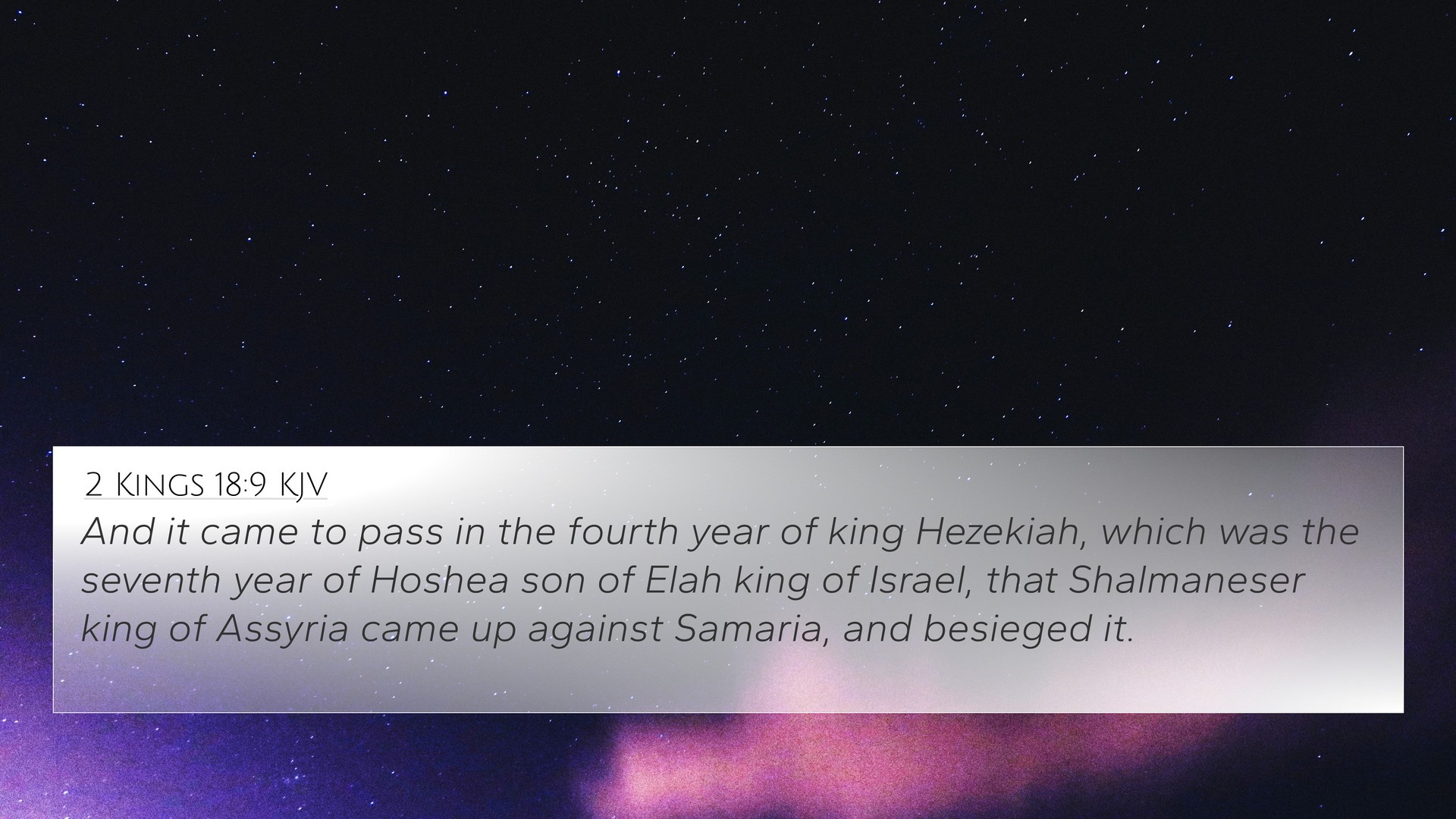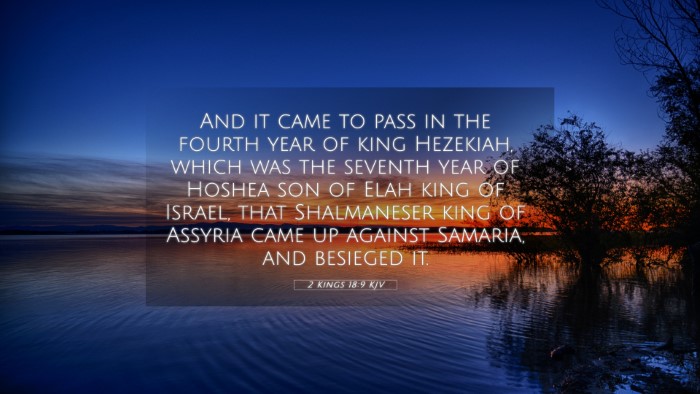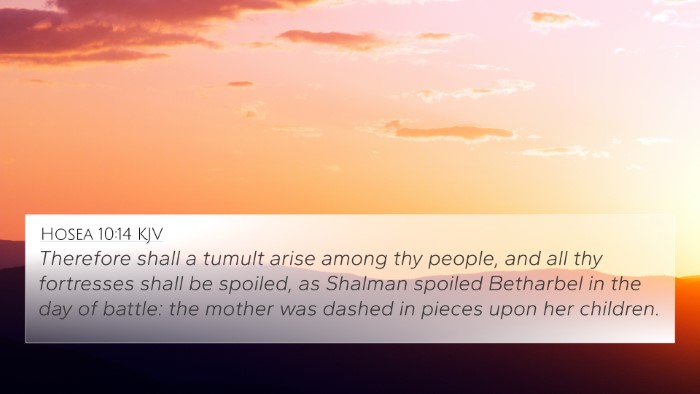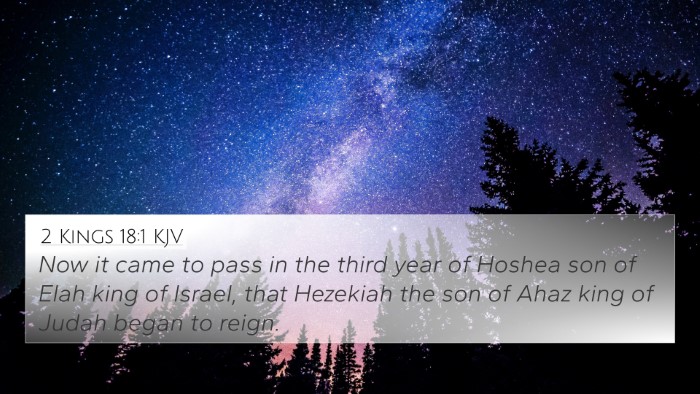Understanding 2 Kings 18:9
Verse Context: In 2 Kings 18:9, we find a historical account describing the actions of King Hezekiah in the southern kingdom of Judah. This verse marks the beginning of a phase in which Hezekiah contends with external threats, particularly from the Assyrian Empire. The events surrounding this verse are significant for understanding the larger narrative of Judah's struggles during this period.
Meaning and Interpretation
The verse states: "And it came to pass in the fourth year of king Hezekiah, which was the seventh year of Hoshea son of Elah king of Israel, that Shalmaneser king of Assyria came up against Samaria, and besieged it." This situation not only signifies the geopolitical dynamics of the time but also reflects themes of faith, reliance on God, and the consequences of sin amongst God’s people.
Historical Background
Hezekiah reigned during a tumultuous time when the Assyrians were expanding their empire, posing a dire threat to the nations surrounding them. This verse serves as a critical point in the larger history of Israel and Judah, showcasing the challenges faced during what can be described as a crisis of faith. The siege of Samaria, mentioned in this verse, marks the conquest of the northern kingdom of Israel, leading to the dispersion of its people.
Theological Insights
- Judgment and Deliverance: The siege signifies the impending judgment upon Israel for their idolatry and disobedience, which serves as a reminder for Judah regarding the consequences of turning away from God.
- Call to Repentance: Hezekiah's reign did not just involve political maneuvering but also a profound spiritual revival, implying God’s mercy amidst judgment.
- Faith in Adversity: This historical account emphasizes the need for faith during times of crisis, as Hezekiah later seeks God’s counsel and deliverance.
Cross-References to Consider
Cross-referencing Biblical texts can illuminate the significance of 2 Kings 18:9 further. Here are some pertinent connections:
- 2 Kings 17:5-7: This passage details the fall of Samaria and the reasons why God allowed it, echoing the themes of judgment and disobedience.
- Isaiah 36:1: This verse provides parallel accounts of the Assyrian invasion confirming the authoritative prophetic voice during Hezekiah’s reign.
- 2 Chronicles 32:1: This text illustrates Hezekiah’s response to the Assyrian threat and shows his commitment to God.
- Isaiah 10:5-6: Here, God discusses using the Assyrians as an instrument of His wrath, linking back to the events of 2 Kings 18:9.
- Psalm 46:1-3: This psalm becomes a source of comfort showing God as a refuge during upheaval.
- Jeremiah 4:6: This scripture parallels the themes of impending judgement through the imagery of danger stemming from the North.
- Matthew 24:15: The New Testament referencing of desolation links back to the historical accounts of judgment in the Old Testament.
Comparative Analysis and Themes
When examining 2 Kings 18:9 alongside these references, we observe connections that lend depth to the understanding of faith under siege:
- God’s Sovereignty: Across the Scriptures, God asserts His ultimate control over nations, and the Assyrian threat merely illustrates human power under divine oversight.
- Covenantal Relationship: The account invites reflection on Israel and Judah's covenantal obligations, which resonates in areas discussing prophetic warnings and calls to return to faithfulness.
- Divine Deliverance: Hezekiah's subsequent actions lead to a miraculous victory, which connects to numerous Biblical themes about reliance on God amid danger.
Tools for Bible Cross-Referencing
To delve deeper into Biblical cross-referencing, consider utilizing the following tools:
- Bible Concordance: A useful resource for finding references and synonyms for terms across the Bible.
- Bible Cross-Reference Guide: Specific editions often provide a range of related verses in their margins or annotations.
- Bible Reference Resources: Various study Bibles include sections dedicated to thematic cross-references as well as studies.
Summary of Key Takeaways
In summary, understanding 2 Kings 18:9 invites us to recognize the interconnectedness of scripture as it reflects on divine judgment and mercy. The thematic links are not only historical but call readers today to examine their own faith journeys amid challenges:
- Examine God's Sovereignty: How does this history reflect God's overarching sovereignty?
- Respond in Faith: In what ways can we instill Hezekiah’s attributes of faith and reliance on God in our lives?
- Lessons from Judgment: What can be learned from the judgment that appears not only relevant historically but personally?
Thus, through cross-referencing, thematic explorations, and deep investigation into Biblical text connections, we arrive at an enriched understanding not just of 2 Kings 18:9, but of the full narrative of God’s dealings with His people.





